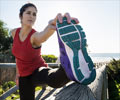Want to run a marathon? If yes, then tie up your running shoes and train yourself well in advance before the big race. Here are a few marathon training tips to know before lacing up the running shoes.
- Running a marathon is always fun and rewarding, but training for a marathon can be a hard work
- Healthy exercise training and practicing at least 12-20 weeks before a big race can help you win a marathon
- Stay well-hydrated, fit and healthy to reach the finish line
Read More..
Johnson, a specialist in foot and ankle disease, injuries and pain management, has seen the damaging effects of marathon training firsthand. He says he sees a significant increase in overuse injuries among runners training for upcoming marathons who try to do too much too soon.
He offers 10 marathon training tips for runners preparing for race day.
1. Get your general health and running form evaluated by a professional
“If you have a history of orthopedic injury, make sure you have the strength needed to safely begin training,” Johnson said. “Neglected sprains and strains can become very symptomatic if poor running form is not corrected early. Even experienced runners often have a muscle imbalance that can lead to injury. An investment in evaluation of your running form prior to starting training can identify these issues, so that treatment can start to address them prior to any injury.”
Experienced runners should begin training at least 12-20 weeks before a big race. Novice runners often need at least nine months to safely progress to the total mileage needed to complete a marathon.
Johnson recommends dynamic stretching and muscle activation prior to activity, followed by static stretching and foam rolling after running. Stretch even on off days, and focus on those muscles most likely to get tight in runners — calves, hip flexors and hamstrings. Do not forget plantar fascia stretching and intrinsic foot muscle strengthening.
4. Slowly build up your mileage
Safe marathon training requires a slow and steady buildup; 5 percent for beginners and around 10 percent for experienced runners, factoring in speed, intervals and hills to maintain a safe rate.
5. Invest in supportive shoes and socks
“Buy shoes slightly larger than you would normally wear, to accommodate the foot swelling that will happen with prolonged mileage,” Johnson said. “Shoes wear out, so keep track of the miles on the shoes and replace them after 200-300 miles.”
6. Listen to your body when you feel pain
Most marathon runners will experience pain at some point in their training, but soreness that persists despite rest warrants an evaluation by a sports medicine provider. Cycling, rowing, water running and swimming are great alternatives during enforced rest. Johnson says do not over-train, which can deplete the body’s resources and lead to fatigue, loss of motivation and a weakened immune system.
7. Cross-train with other exercises besides running
Switch things up occasionally with biking, swimming, weightlifting and other activities you enjoy. “Specific strengthening of muscles that assist in stabilization, such as gluteal muscles and abdominal muscles, is helpful,” Johnson said. “Changing from road running to trail running for a few workouts is also helpful, as the surface is softer and the stride lengths are different, which again activates a different set of muscles.”
8. Strengthen your core and improve balance
Many overuse injuries occur due to a weak core and weak hip-stabilizing muscles.
9. Pay attention to hydration and nutrition
Adequate hydration and nutrition are essential as training breaks down muscles, so refuel with healthy, whole and natural fuels that rebuild muscles and prepare the body for the next training session. Johnson recommends eating a healthy mix of carbs and protein 30-45 minutes after the workout to refuel the body’s depleted resources.
10. Practice good cool-down habits
The cool-down helps lower the heart rate to normal levels, which aids in recovery and allows for more frequent training. Stretching and using a foam roller are great cool-down habits to get into after runs.
Reference:
- 10 Training Tips to Prepare for the Mercedes Marathon - (https://www.uabmedicine.org/-/10-training-tips-to-prepare-for-the-mercedes-marathon)
Source-Newswise













